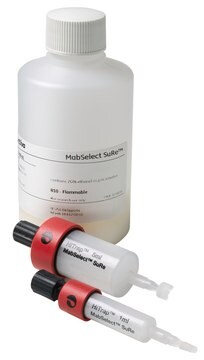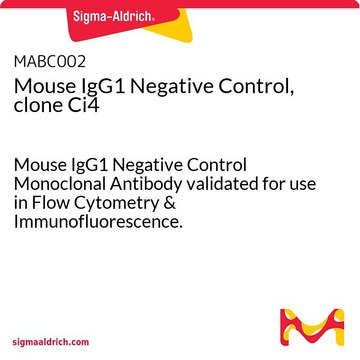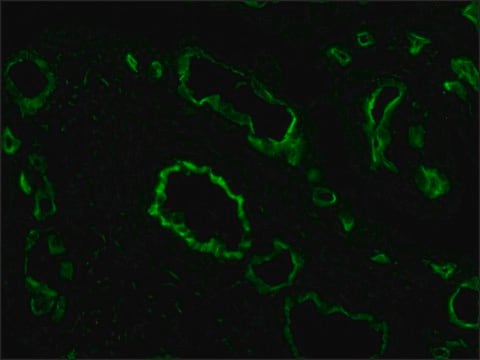MABC006
Mouse IgG2b Negative Control, clone GC198
Mouse IgG2b Negative Control Monoclonal Antibody validated for use in Flow Cytometry & Immunofluorescence.
Faça loginpara ver os preços organizacionais e de contrato
About This Item
Código UNSPSC:
12352203
eCl@ss:
32160702
NACRES:
NA.42
Produtos recomendados
fonte biológica
mouse
Nível de qualidade
forma do anticorpo
purified immunoglobulin
clone
GC198, monoclonal
fabricante/nome comercial
Chemicon®
concentração
0.5 mg/mL
técnica(s)
flow cytometry: suitable
immunofluorescence: suitable
Isotipo
IgG2b
Condições de expedição
wet ice
modificação pós-traducional do alvo
unmodified
Especificidade
This antibody reacts with the outer membrane protein of some strains of Neisseria gonorrhoeae. No reaction with human cell surface or plasma components has been observed. However, some binding to Fc receptors may occur.
Imunogênio
Protein I preparation from Neisseria gonorrhoeae.
Aplicação
Mouse IgG2b is a monoclonal antibody intended for use as a negative control in immunofluorescence, flow cytometry, and immunoperoxidase staining on frozen and paraffin tissue sections. Its use enables an estimation of non specific binding of mouse monoclonal antibodies to cell surface components in peripheral blood and tissue.
SUGGESTED USAGE
The control antibody should be diluted to the same concentration as the test antibody, and equivalent volumes used.
SUGGESTED USAGE
The control antibody should be diluted to the same concentration as the test antibody, and equivalent volumes used.
Research Category
Secondary & Control Antibodies
Epitope Tags & General Use
Secondary & Control Antibodies
Epitope Tags & General Use
Research Sub Category
Isotype Control Antibodies
Isotype Control Antibodies
Ligação
Replaces: CBL602
forma física
Format: Purified
Purified immunoglobulin. The antibody is supplied in 0.5ml 25mM Tris-HCl, 0.4M NaCl, pH 8.0, containing 0.2% bovine serum albumin and 0.1% sodium azide. The characteristics of each lot are tested by electrophoresis, specific immunofluorescence assay and flow cytometry.
Armazenamento e estabilidade
Store at 2 to 8°C, for up to 6 months. For prolonged periods, store below -20°C in undiluted aliquots. AVOID REPEATED FREEZE/THAW CYCLES.
WARNING: The monoclonal reagent solution contains 0.1% sodium azide as a preservative. Due to potential hazards arising from the build up of this material in pipes, spent reagent should be disposed of with liberal volumes of water.
WARNING: The monoclonal reagent solution contains 0.1% sodium azide as a preservative. Due to potential hazards arising from the build up of this material in pipes, spent reagent should be disposed of with liberal volumes of water.
Informações legais
CHEMICON is a registered trademark of Merck KGaA, Darmstadt, Germany
Exoneração de responsabilidade
Unless otherwise stated in our catalog or other company documentation accompanying the product(s), our products are intended for research use only and are not to be used for any other purpose, which includes but is not limited to, unauthorized commercial uses, in vitro diagnostic uses, ex vivo or in vivo therapeutic uses or any type of consumption or application to humans or animals.
Palavra indicadora
Warning
Frases de perigo
Declarações de precaução
Classificações de perigo
Met. Corr. 1
Código de classe de armazenamento
8B - Non-combustible corrosive hazardous materials
Classe de risco de água (WGK)
WGK 2
Ponto de fulgor (°F)
Not applicable
Ponto de fulgor (°C)
Not applicable
Certificados de análise (COA)
Busque Certificados de análise (COA) digitando o Número do Lote do produto. Os números de lote e remessa podem ser encontrados no rótulo de um produto após a palavra “Lot” ou “Batch”.
Já possui este produto?
Encontre a documentação dos produtos que você adquiriu recentemente na biblioteca de documentos.
Kristina Hopfensperger et al.
mBio, 11(4) (2020-07-16)
HLA-C-mediated antigen presentation induces the killing of human immunodeficiency virus (HIV)-infected CD4+ T cells by cytotoxic T lymphocytes (CTLs). To evade killing, many HIV-1 group M strains decrease HLA-C surface levels using their accessory protein Vpu. However, some HIV-1 group
Wells S Brown et al.
Cell reports. Medicine, 1(8), 100131-100131 (2020-12-10)
Activating KRAS mutations are found in over 90% of pancreatic ductal adenocarcinomas (PDACs), yet KRAS has remained a difficult target to inhibit pharmacologically. Here, we demonstrate, using several human and mouse models of PDACs, rapid acquisition of tumor resistance in
Cole D Libner et al.
The Journal of comparative neurology, 528(10), 1704-1724 (2019-12-25)
Neurodegeneration, including loss of neurons and axons, is a feature of progressive forms of multiple sclerosis (MS). The mechanisms underlying neurodegeneration are mostly unknown. Research implicates autoimmunity to nonmyelin self-antigens as important contributors to disease pathogenesis. Data from our lab
Nossa equipe de cientistas tem experiência em todas as áreas de pesquisa, incluindo Life Sciences, ciência de materiais, síntese química, cromatografia, química analítica e muitas outras.
Entre em contato com a assistência técnica

![3-Aminoimidazo[1,2-a]pyridine 97%](/deepweb/assets/sigmaaldrich/product/structures/177/879/133fd1ee-499a-4242-9d3c-406e87ce1d6c/640/133fd1ee-499a-4242-9d3c-406e87ce1d6c.png)







